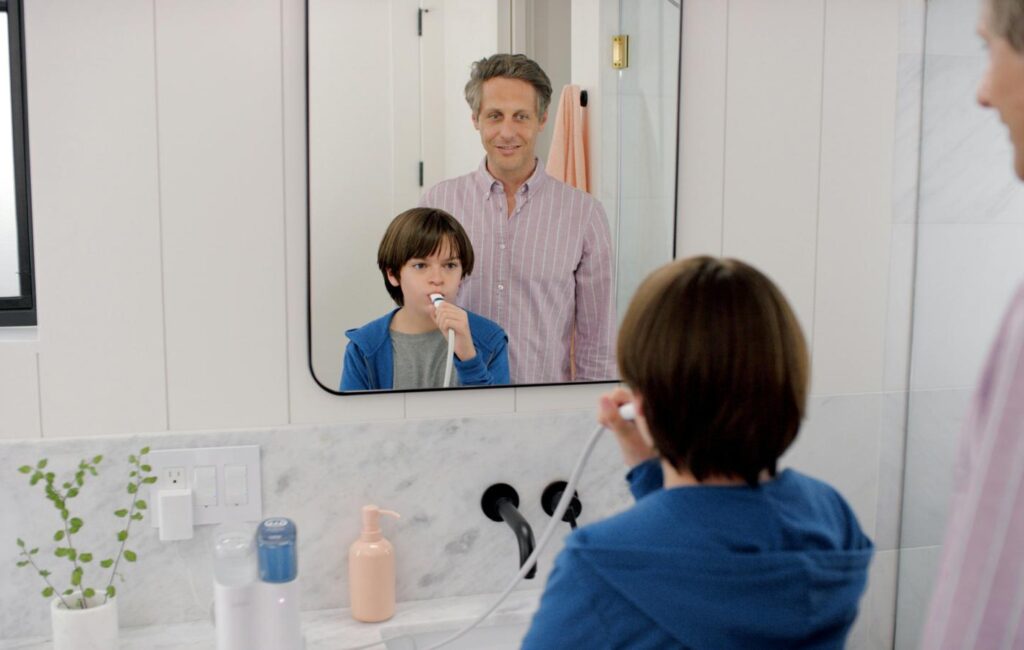
Meeting Resistance with Connection: Brushing, Nose-Cleaning, and More
A frequent problem parents encounter is the difficulty of performing various health-related procedures—brushing teeth, cleaning the nose, doing physiotherapy exercises. If you’re a parent, you probably have your own list.
What’s behind the behavior?
The main issue is the child’s immaturity—especially in children younger than 10. They often don’t have the ability to understand the importance of the procedure in the way their parents do, due to a lack of life experience and knowledge. Even if they do understand, they may not remember it when faced with something that feels scary or unpleasant. A young child’s brain is not yet developed enough to hold two conflicting things at the same time. Alarm or counterwill are powerful drives that can override cognition in seconds.
In addition, young children are not yet capable of working toward long-term goals. Their brain is wired for play. The ability to “work” emerges only when a child becomes developmentally able to hold a goal in mind while also facing the obstacles that stand in the way of achieving it.
Beyond immaturity, relationship issues can exacerbate the problem. If, due to a child’s sensitivity or a parent’s approach being too harsh or not leading enough, the child does not feel safe depending on the parent, the child may experience the caregiving hierarchy in reverse. In this case, they perceive themselves as the one who should lead and take care of the parent. Neufeld calls this phenomenon the Alpha Child. A child in this position is unlikely to receive care from the parent—especially when it comes to unpleasant procedures.
Sometimes, a child cannot be led by their parents because they are oriented toward a sibling instead. This is a specific form of peer orientation. When the child orbits around an immature sibling rather than a parent, it can look like two uncontrollable tornadoes that the parents struggle in vain to settle.
Sensory sensitivity is another factor. Children vary greatly in how they experience sensory input. A procedure that seems painless to us—like teeth brushing—may cause significant discomfort or even pain to a sensitive child.
⸻
What is the solution?
If the problem is relational:
We need to repair the relationship. We talk more about the inverted caregiving hierarchy in our course Alpha Children.
Peer orientation is addressed in Gordon Neufeld’s book co-authored with Gabor Maté, Hold On to Your Kids.
If the problem is immaturity:
The answer lies in play, routines, and rituals. Immature creatures are built to play. So if we’re not a mom brushing her child’s teeth but a bird cleaning a hippo’s teeth, that’s a whole different story. And when she “finds” unexpected objects between the teeth—like a shoe or a chair—the experience becomes much more engaging for the child.
When activities happen at the same time and in the same order over and over, they become familiar and can even offer emotional safety.
If the problem is sensitivity:
First, consider whether the procedure can be skipped or replaced. Look for alternatives.
For example, I replaced an impossible-to-maintain exercise for strabismus, recommended and insisted upon by an ophthalmologist, with the simple use of a straw while drinking—suggested by HANDLE approach specialists. The problem was resolved faster and without struggles. Many physiotherapy exercises can be replaced by gentler approaches that are more respectful of a child’s sensitivity and dignity.
One of my children was afraid of using a vacuum-powered nasal aspirator because of the noise, but accepted the hand pump instead.
Or consider switching from lying to sitting when administering saline nose drops.
Let the child do it themselves if possible. Give them a sense of control—for instance, don’t begin until they say they’re ready.
Smaller needles and topical anesthetics can reduce the pain of blood tests.
I also consciously chose not to insist on speech therapy exercises that my kids resisted—I decided they weren’t important enough at the time. Their speech issues have spontaneously resolved with age. Sometimes, it’s enough to let Nature take its course and be patient.
⸻
Can one use power to make a child comply with a procedure?
I recommend avoiding the use of physical force over a child whenever possible. Undergoing an unpleasant or painful procedure under coercion is a situation with a high risk of psychological trauma. Peter Levine, among others, writes about this.
Furthermore, the parent risks losing the child’s trust, which makes future cooperation even harder and can create a range of behavioral and emotional challenges.
But if there is truly no alternative—the procedure must be done, cannot be skipped or replaced, and is essential to the child’s health based on the best judgment of the parents—and if there is absolutely no way to help the child cooperate, then there may be no choice. However, this should be an absolute last resort and used only for essential procedures.
And in that case, much repair work must be done—during and after the procedure. Don’t let the event go by unprocessed. You will need to work hard to rebuild the relationship and regain the child’s trust. Use play to help the child express their emotions and to avoid emotional stuckness or dissociation that could lead to trauma.
We talk more about this in our webinar Děti a zdravotní systém – příručka pro rodiče (In Czech).
👉 Link to the webinar: Kurzy a webináře
If you need to address the issue urgently or more personally, we offer 1:1 consultations.
👉 Details here: Services
Author: Lina Vizelman
Photo: Willo Team
